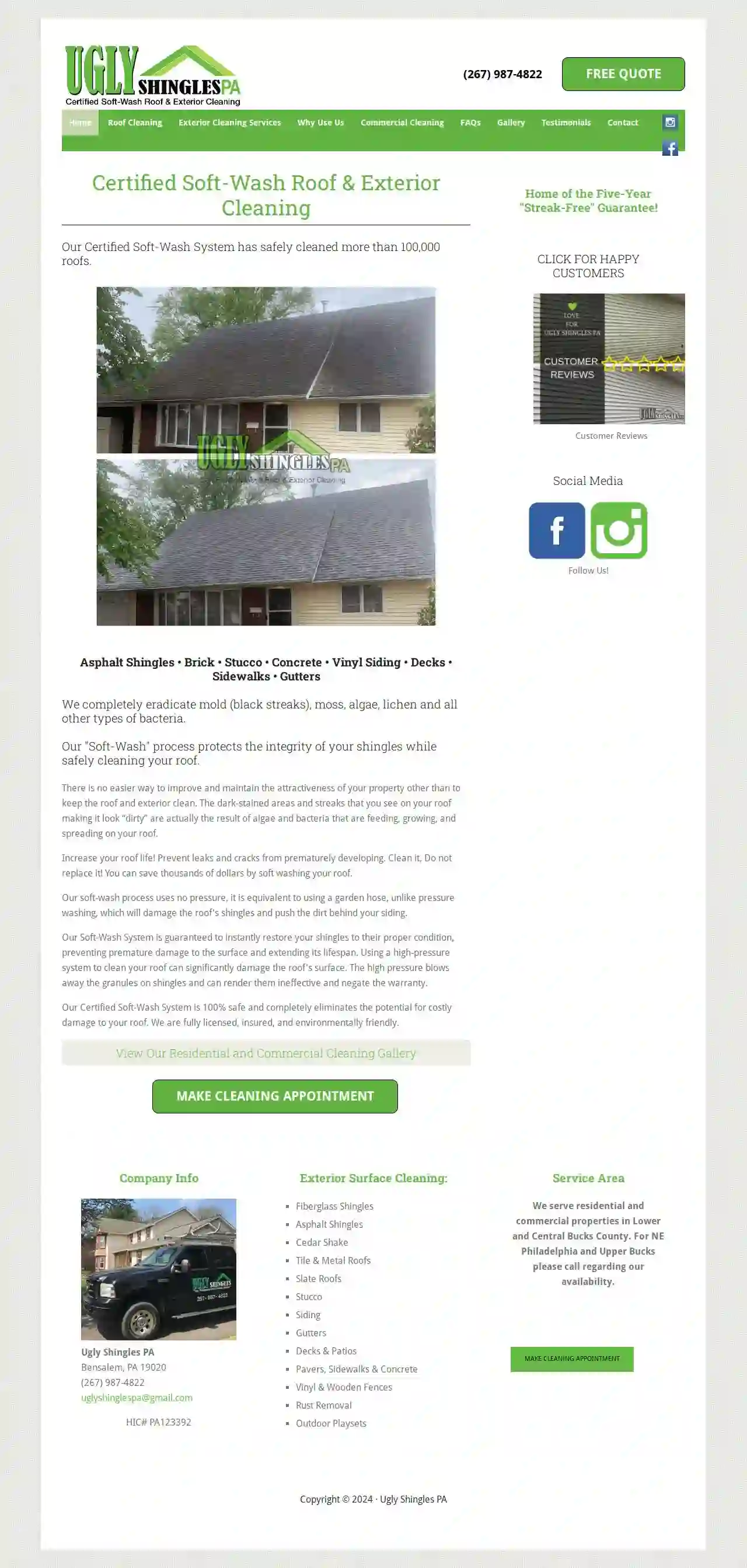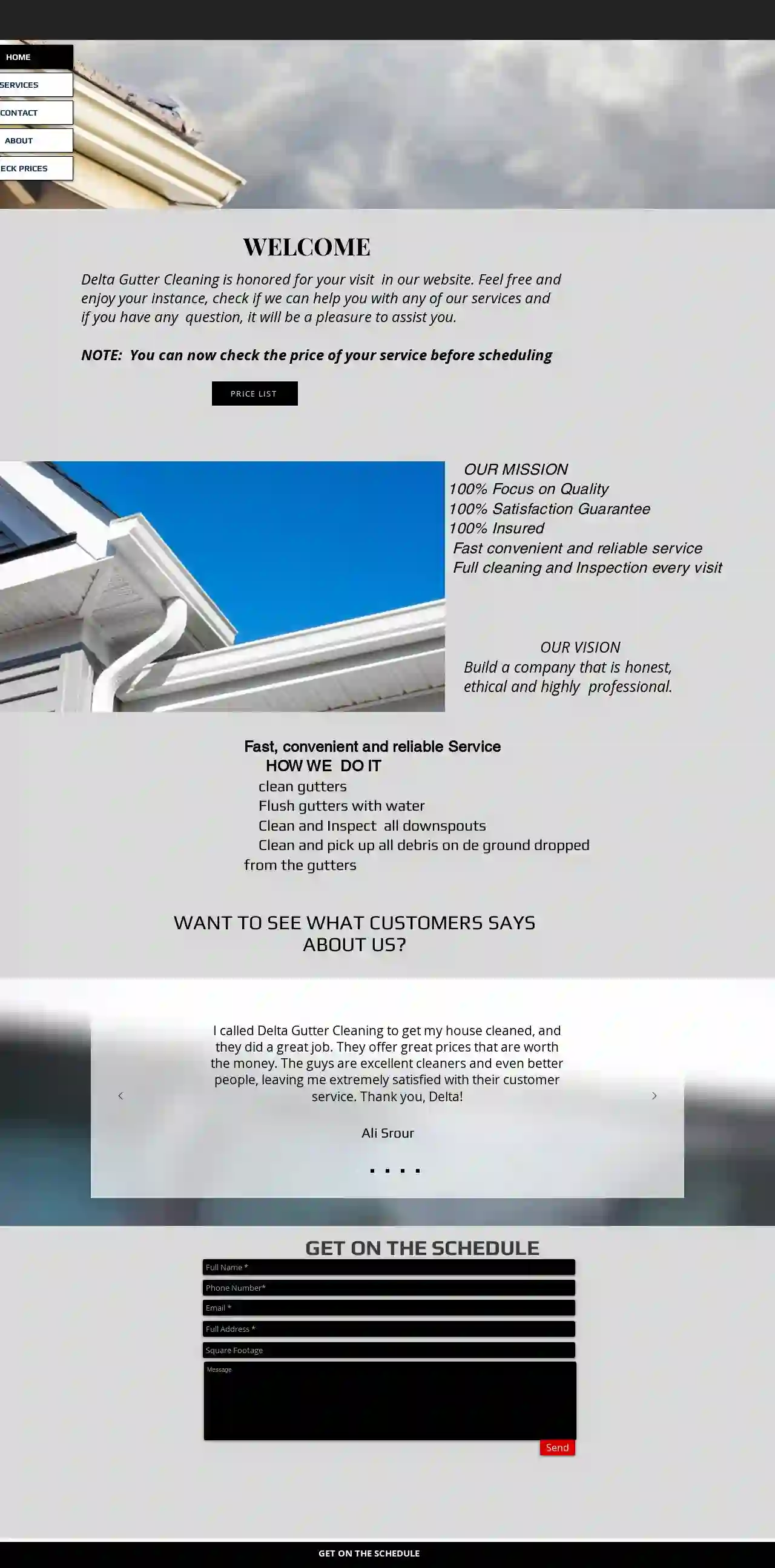Gutter Cleaning Ridgway
Best Roof Gutter Cleaning in Ridgway
Get up to 3 Gutter Cleaning quotes for your project today! Compare profiles, reviews, accreditations, portfolio, etc... and choose the best offer.

Ugly Shingles PA
535 reviewsBensalem, 19020, USUgly Shingles PA is a certified soft-wash roof and exterior cleaning company serving residential and commercial properties in Lower and Central Bucks County. We have safely cleaned over 100,000 roofs using our proven soft-wash system. Our process effectively eliminates mold, moss, algae, lichen, and other bacteria from asphalt shingles, brick, stucco, concrete, vinyl siding, decks, sidewalks, and gutters. Unlike pressure washing, our soft-wash method is gentle on your roof, preventing damage and extending its lifespan. We are fully licensed, insured, and environmentally friendly. We offer a five-year "Streak-Free" Guarantee and are committed to providing exceptional customer service.
- Services
- Why Us?
- Accreditations
- Gallery
Get Quote
Gutter Doctor
4.4124 reviewsAllentown, USNed's Home recently acquired Gutter Doctor. For over 50 years, our organization has continually grown, serving customers in over 18 states. Honoring the tradition of hard work and quality services, we work 7 days a week to ensure every customer is happy. With crews receiving hands-on and rigorous training in our state-of-the-art facility, we fully guarantee every job we perform. Carrying full worker’s compensation and liability insurance, we let you rest easy knowing you’re not only protecting your home but yourself as well. How does the purchase/acquisition benefit customers? Expanded Gutter Replacement and Cleaning Services Access to More Exterior Home Maintenance Professionals Ned’s Home Has an A+ Rating With the Better Business Bureau Ned’s Home Has Earned the Home Advisor Elite Service Status Ned’s Home Has Earned the Angie’s List Honor Roll Award Access to Gutter Cleaning Professionals that Are a Part of the National Rain Gutters Contractor Association (NRGCA) At our company, we are proud to be recognized as the Gutter Doctor. This title was earned through our unwavering dedication to upholding the highest standards of professionalism, as well as our meticulous attention to detail in every aspect of our work. We believe that exceptional customer service is not just a goal, but a requirement, and we strive to provide our customers with the best possible experience from start to finish. Whether it’s repairing, cleaning, or installing gutters, we take pride in our work and are committed to ensuring that our customers are completely satisfied with the results. Full Insurance Coverage We take pride in providing fully insured gutter installation and repair services to our customers, ensuring that they are protected and giving them the peace of mind they deserve. Our insurance coverage is designed to protect both our customers and our employees. 30 Years of Experience We have been serving Pennsylvania, Delaware, and New Jersey, for over 30 years. Our extensive experience has taught us the ins and outs of the industry, and we are committed to using this knowledge to provide exceptional service to our customers. Our Mission At Ned’s Home, our mission is to provide our customers with the highest level of service possible. We work hard every day, 7 days a week, to ensure that every job is done right and every customer is happy. Our ultimate goal is to earn your trust and become your go-to provider for all your gutter and home service needs.
- Services
- Why Us?
- Accreditations
- Gallery
Get Quote
Proworks Graffiti Removal Services
Gibsonia, 15044, USWelcome To ProWorks Professional Services, Inc.Thank you for visiting the ProWorks website. ProWorks is a Professional Specialty Cleaning company offering commercial and residential pressure washing services in the Pittsburgh, PA area. Our application experience and proven cleaning techniques are the reason our clients choose us as a solution to their cleaning needs.ProWorks Professional Services offers Graffiti Removal, Awning Cleaning, Deck Cleaning, Gutter Cleaning, Brick & Masonry Cleaning, Concrete Cleaning, Siding Cleaning, Roof Cleaning and other pressure washing services. All these services are offered to commercial and residential clients. Our proven service techniques and application knowledge helps us to exceed the expectation of each customer. We proudly serve Pittsburgh, PA and surrounding areas.
- Services
- Why Us?
- Our Team
- Gallery
Get Quote
Gutter King LLC
4.542 reviews56 Turbotville Rd, Milton, 17847, USGutter King LLC is a full service gutter company who has proudly provided the Greater Susquehanna Valley with over 20 years of excellent residential and commercial Gutter Services. We offer seamless gutter installation, gutter cleaning and repair work, down-spouting, leaf guard protection, half-round gutter installation, soffit & fascia replacement, underground flex pipe installation and much more. We can help you with nearly any gutter related service you can think of. Fill in the form or give us a call and we look forward to providing you with excellent service! Trusted • Reliable • Affordable.
- Services
- Why Us?
- Accreditations
- Our Team
- Testimonials
- Gallery
Get Quote
The SpoutOff Rain Gutter Company
51 reviewsPhiladelphia, USThe SpoutOff gutter outlet is a self-cleaning rain gutter outlet that does not clog. It is designed to prevent costly water damage to your roof, ceiling, siding, and landscaping. The SpoutOff gutter outlet is 3 to 4 times larger than a standard gutter outlet, with no lip around the top to catch debris. When debris reaches The SpoutOff gutter outlet, it has no place to go but down, preventing clogging. The SpoutOff gutter outlet is easy to install and maintain, and it does not require a ladder to clean. With The SpoutOff, you can say goodbye to clogged gutters and hello to a safe and worry-free home.
- Services
- Why Us?
- Gallery
Get Quote
All Complete Construction
4.777 reviewsGreat Meadows, 5 Danielle Drive, 07838, USAt All Complete Construction, we take pride in our hard work and dedication to detail. We have over eighteen years of experience and can take on any job no matter the size. We value every single customer and treat each job with careful attention. We look forward to working with you soon! We are a family owned business: “I chose to work in this industry because I always had an interest in building. As a young boy, I would spend hours building houses made out of mud in my backyard. But it wasn’t until I watched my father build our home, that I realized construction was my passion.”
- Services
- Why Us?
- Accreditations
- Gallery
Get Quote
Allstar Gutter Cleaning
529 reviewsPhiladelphia, USAll Star Gutter Cleaning delivers a peace of mind when it comes to gutter cleaning services. Get the very best gutter cleaning service servicing the Pennsylvania area. We are fully Insured. Our business insurance does more than protect you. We the right policy to show you, our customer that we take managing risk seriously. You will never again struggle with your gutters. We offer these and other services to improve your home
- Services
- Why Us?
- Gallery
Get Quote
Everything Gutter
4.134 reviews1775 US Highway 1 South #1049, St. Augustine, 32084, USEverything Gutter is a family-owned and operated business that provides superior gutter services to homeowners in Pennsylvania, Delaware, Maryland, and Florida. We pride ourselves on our commitment to quality, customer service, and community involvement. Our team of certified master gutter installers uses only the highest quality materials and latest technology to ensure that our customers receive the best possible results. We offer a range of services, including seamless gutter installation, gutter guards, gutter cleaning, and gutter repair. Our goal is to provide our customers with peace of mind, knowing that their gutters are functioning properly and protecting their homes from water damage. We are fully insured, licensed, and bonded, and we offer a lifetime warranty on all our work. We also offer financing options and a best price guarantee. Contact us today to schedule a free evaluation and take advantage of our special offers.
- Services
- Why Us?
- Accreditations
- Our Team
- Testimonials
- Gallery
Get Quote
All Pro Gutter Guards
584 reviews2220 Maplewood Ave, Willow Grove, 19090, USAll Pro Gutter Guards is a family-owned business that provides gutter guard and gutter cleaning services to residential and commercial customers. We manufacture custom seamless gutters and dispatch our staff and trucks to service homes and businesses in Willow Grove, PA, and the surrounding area. Our team of skilled installers and repair experts offers top-notch installation, repair, and replacement services for gutters, gutter guards, and downspouts. We pride ourselves on providing excellent customer service and ensuring worry-free gutters for our clients.
- Services
- Why Us?
- Gallery
Get Quote
Delta Gutter Cleaning
567 reviewsPhiladelphia, USDelta Gutter Cleaning is honored for your visit in our website. Feel free and enjoy your instance, check if we can help you with any of our services and if you have any question, it will be a pleasure to assist you. Our mission is to provide 100% focus on quality, 100% satisfaction guarantee, 100% insured, fast, convenient, and reliable service, and full cleaning and inspection every visit. We are committed to building a company that is honest, ethical, and highly professional.
- Services
- Why Us?
- Testimonials
- Gallery
Get Quote
Over 60,241+ Janitorial Services in our network
Our janitorial companies operate in Ridgway & surroundings!
CleaningMatch has curated and vetted Top Cleaning Services near Ridgway. Find a top & reliable pro today.
Frequently Asked Questions About Gutter Cleaning
- Reduced Leaks: Seamless gutters have fewer seams, reducing the likelihood of leaks developing over time.
- Improved Appearance: Seamless gutters create a more aesthetically pleasing and streamlined look along your roofline.
- Less Maintenance: Fewer seams mean less opportunity for debris to accumulate, reducing the frequency of cleaning needed.
- Regular Gutter Cleaning: Cleaning gutters at least twice a year prevents debris buildup and ensures proper water flow.
- Tree Trimming: Trim trees and branches near your roofline to reduce leaf and debris accumulation in gutters.
- Gutter Guard Installation: Installing gutter guards can significantly reduce debris buildup and minimize cleaning needs.
- Regular Inspections: Inspect your gutters regularly for signs of damage, such as cracks, leaks, or sagging.
- Prompt Repairs: Address any gutter damage promptly to prevent further deterioration and water damage.
- Visual Inspection: The inspector visually examines the gutters for signs of damage, such as cracks, holes, sagging, or rust.
- Debris Check: The inspector checks for debris buildup in the gutters and downspouts.
- Fastener Check: The inspector examines the gutter fasteners to ensure they are secure and holding the gutters properly.
- Downspout Inspection: The inspector checks for proper alignment, clogs, or damage to the downspouts.
- Water Flow Test: The inspector may perform a water flow test to ensure water is flowing freely through the gutters and downspouts.
- Ladders and Safety Equipment: They use sturdy ladders and safety harnesses to access gutters safely.
- Gutter Scoops and Hand Tools: They use gutter scoops, trowels, and other hand tools to remove leaves, twigs, and debris from gutters.
- Blowers and Vacuums: They may use blowers or vacuums to remove lighter debris and leaves from gutters and downspouts.
- Pressure Washing: Some gutter cleaners use pressure washers to flush out stubborn debris and clean the gutters thoroughly.
- Debris Disposal: They bag and dispose of the collected debris properly.
What are seamless gutters, and are they better than sectional gutters?
Advantages of Seamless Gutters:
While seamless gutters offer advantages, sectional gutters are typically more affordable and easier to repair if a section becomes damaged. The best choice for your home depends on your budget, aesthetic preferences, and the length and complexity of your roofline.
How can I prevent gutter problems?
By taking these preventive steps, you can protect your home from water damage, extend the lifespan of your gutters, and minimize the need for costly repairs.
What is involved in a gutter inspection?
A professional gutter inspection can identify potential problems early on, preventing costly repairs and water damage. It's recommended to have your gutters inspected annually, ideally before the rainy season.
How do professional gutter cleaners clean gutters?
Professional gutter cleaners have the experience, equipment, and knowledge to ensure thorough and safe gutter cleaning.
What are seamless gutters, and are they better than sectional gutters?
Advantages of Seamless Gutters:
- Reduced Leaks: Seamless gutters have fewer seams, reducing the likelihood of leaks developing over time.
- Improved Appearance: Seamless gutters create a more aesthetically pleasing and streamlined look along your roofline.
- Less Maintenance: Fewer seams mean less opportunity for debris to accumulate, reducing the frequency of cleaning needed.
While seamless gutters offer advantages, sectional gutters are typically more affordable and easier to repair if a section becomes damaged. The best choice for your home depends on your budget, aesthetic preferences, and the length and complexity of your roofline.
How can I prevent gutter problems?
- Regular Gutter Cleaning: Cleaning gutters at least twice a year prevents debris buildup and ensures proper water flow.
- Tree Trimming: Trim trees and branches near your roofline to reduce leaf and debris accumulation in gutters.
- Gutter Guard Installation: Installing gutter guards can significantly reduce debris buildup and minimize cleaning needs.
- Regular Inspections: Inspect your gutters regularly for signs of damage, such as cracks, leaks, or sagging.
- Prompt Repairs: Address any gutter damage promptly to prevent further deterioration and water damage.
By taking these preventive steps, you can protect your home from water damage, extend the lifespan of your gutters, and minimize the need for costly repairs.
What is involved in a gutter inspection?
- Visual Inspection: The inspector visually examines the gutters for signs of damage, such as cracks, holes, sagging, or rust.
- Debris Check: The inspector checks for debris buildup in the gutters and downspouts.
- Fastener Check: The inspector examines the gutter fasteners to ensure they are secure and holding the gutters properly.
- Downspout Inspection: The inspector checks for proper alignment, clogs, or damage to the downspouts.
- Water Flow Test: The inspector may perform a water flow test to ensure water is flowing freely through the gutters and downspouts.
A professional gutter inspection can identify potential problems early on, preventing costly repairs and water damage. It's recommended to have your gutters inspected annually, ideally before the rainy season.
How do professional gutter cleaners clean gutters?
- Ladders and Safety Equipment: They use sturdy ladders and safety harnesses to access gutters safely.
- Gutter Scoops and Hand Tools: They use gutter scoops, trowels, and other hand tools to remove leaves, twigs, and debris from gutters.
- Blowers and Vacuums: They may use blowers or vacuums to remove lighter debris and leaves from gutters and downspouts.
- Pressure Washing: Some gutter cleaners use pressure washers to flush out stubborn debris and clean the gutters thoroughly.
- Debris Disposal: They bag and dispose of the collected debris properly.
Professional gutter cleaners have the experience, equipment, and knowledge to ensure thorough and safe gutter cleaning.